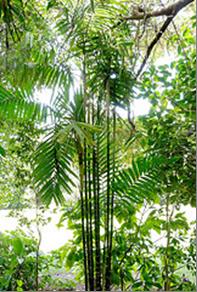Emerald palm
| Infobox on Emerald palm | |
|---|---|
| Example of Emerald palm |  |
| Facts | |
| Origin | - |
| Stowage factor (in m3/t) | - |
| Humidity / moisture | - |
| Ventilation | - |
| Risk factors | See text |
Emerald palm
Contents
Description / Shipment / Storage / Risk factors
Scientific Name and Introduction
Chamaedorea spp. Chamaedorea is a small-leaved member of the palm family with leaves that perform well in the vase. Three other members of the palm family (coconut, date-palm, and oil-palm) make up the commercially important species for food consumption in North America.
Quality Characteristics and Criteria
Chamaedorea palms are harvested in the wild as well as being produced in plantations. Fronds are harvested when fully expanded, mature, and dark green. Fronds of Chamaedorea should be dark green, clean, and uniform. Avoid fronds whose leaf tips show marginal necrosis or dead areas and fronds that are beginning to turn yellow.
Grading and Bunching
There are no formal grade standards for Chamaedorea, but uniformity, size, colour, and absence of defects are important criteria of quality. Bunches of Emerald palm contain 25 stems.
Ethylene Sensitivity
Exposure to ethylene has no deleterious effects on Chamaedorea fronds.
Pretreatments
No pretreatments are recommended for Chamaedorea fronds.
Storage Conditions
As Chamaedorea is a tropical foliage, it is sensitive to chilling damage if stored at low temperatures for extended periods. Fronds may be stored for 1 to 2 weeks at 12,5ºC and high RH.
Packing
Fronds are packed densely, usually without sleeves of paper, in standard horizontal fibreboard boxes.
Special Considerations
Early death of the fronds, drying, and inrolling of the individual leaves (pinnae) is the result of water stress. So, make sure stems are re-cut before arranging them as this can quadruple their life. The species is chill sensitive, so hold at proper temperatures.
Sources used
BMT Consolidated Manual on (Dutch) Flower Bulbs, cut flowers/greens and potted plants.











